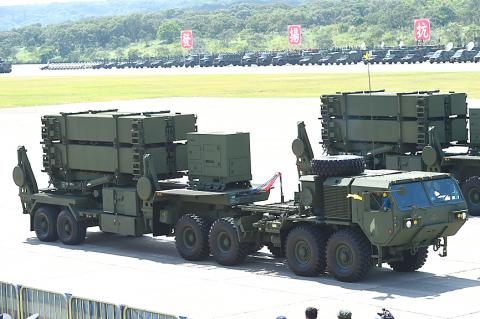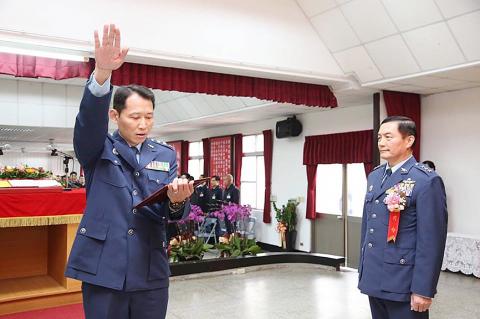The Ministry of National Defense said Patriot Advanced Capability-3 (PAC-3) missile batteries have been deployed on the east coast in response to an increased Chinese military presence in the area.
To improve integrated air defense capabilities, the ministry has deployed missiles to Hualien and Taitung counties, and merged the Air Defense Missile Command with the air force to streamline the chain of command, a ministry report submitted to the Legislative Yuan said.
The reorganization and relocation was ordered after the Chinese People’s Liberation Army (PLA) conducted several long-distance naval and aviation training missions — featuring an aircraft carrier and fleets of nuclear-capable bombers — in the East China Sea, South China Sea, East Indian Ocean and western Pacific Ocean to demonstrate its long-range power projection capabilities and Beijing’s ambition to dominate the Asia-Pacific region.

Photo: Chang Chia-ming, Taipei Times
Annual military exercises would test the effectiveness of the deployments, the ministry said.
It is the first time the ministry has confirmed the deployments, after speculation emerged following the publication of photographs last month showing missiles in the military’s air defense bases in eastern Taiwan.
The report also announced a doctrinal shift from “effective deterrence” to “multiple deterrence.”

Photo: Military News Agency
The ministry said that it would develop the defense industry to ensure self-sufficiency and national security.
A quadrennial defense review, along with three defense plans that are expected to be the guidelines for the nation’s military buildup, are to be submitted to the Legislative Yuan by March 19.
The military is to conduct new exercises, including integrated air-and-sea training, rescue missions, fishing boat escort missions and supply missions in response to the PLA’s actions.
In addition to field exercises, computer-aided simulations are to be part of regular armed forces exercises.
A tactical engagement simulation system has been built for the army, and the ministry is exploring creating new simulation systems using virtual and augmented-reality technologies.
Measures have been taken to improve the military’s digital warfare capabilities this year, with Academia Sinica and the National Chungshan Institute of Science and Technology forming partnerships with the military, the ministry added.
The Air Defense Missile Command was yesterday merged with the air force at a handover ceremony at the command’s Taishan District (泰山) headquarters in New Taipei City.
The command, to be headed by Colonel Yu Jen-ming (游仁明), is expected to merge with the Air Defense Artillery Command to improve operational efficiency.
“The missile command is a high-tech, combat-ready unit and it is one of the most important components of the integrated air defense system,” Air Force Commander General Shen Yi-ming (沈一鳴) said.
The merger would see the transfer of PAC-3, Tien Kung anti-ballistic missiles and Hawk anti-aircraft missiles, as well as tactical counterstrike missiles and Hsiung Feng 2E cruise missiles, to the air force.

‘CORRECT IDENTIFICATION’: Beginning in May, Taiwanese married to Japanese can register their home country as Taiwan in their spouse’s family record, ‘Nikkei Asia’ said The government yesterday thanked Japan for revising rules that would allow Taiwanese nationals married to Japanese citizens to list their home country as “Taiwan” in the official family record database. At present, Taiwanese have to select “China.” Minister of Foreign Affairs Lin Chia-lung (林佳龍) said the new rule, set to be implemented in May, would now “correctly” identify Taiwanese in Japan and help protect their rights, the Ministry of Foreign Affairs said in a statement. The statement was released after Nikkei Asia reported the new policy earlier yesterday. The name and nationality of a non-Japanese person marrying a Japanese national is added to the

AT RISK: The council reiterated that people should seriously consider the necessity of visiting China, after Beijing passed 22 guidelines to punish ‘die-hard’ separatists The Mainland Affairs Council (MAC) has since Jan. 1 last year received 65 petitions regarding Taiwanese who were interrogated or detained in China, MAC Minister Chiu Chui-cheng (邱垂正) said yesterday. Fifty-two either went missing or had their personal freedoms restricted, with some put in criminal detention, while 13 were interrogated and temporarily detained, he said in a radio interview. On June 21 last year, China announced 22 guidelines to punish “die-hard Taiwanese independence separatists,” allowing Chinese courts to try people in absentia. The guidelines are uncivilized and inhumane, allowing Beijing to seize assets and issue the death penalty, with no regard for potential

‘UNITED FRONT’ FRONTS: Barring contact with Huaqiao and Jinan universities is needed to stop China targeting Taiwanese students, the education minister said Taiwan has blacklisted two Chinese universities from conducting academic exchange programs in the nation after reports that the institutes are arms of Beijing’s United Front Work Department, Minister of Education Cheng Ying-yao (鄭英耀) said in an exclusive interview with the Chinese-language Liberty Times (the Taipei Times’ sister paper) published yesterday. China’s Huaqiao University in Xiamen and Quanzhou, as well as Jinan University in Guangzhou, which have 600 and 1,500 Taiwanese on their rolls respectively, are under direct control of the Chinese government’s political warfare branch, Cheng said, citing reports by national security officials. A comprehensive ban on Taiwanese institutions collaborating or

STILL COMMITTED: The US opposes any forced change to the ‘status quo’ in the Strait, but also does not seek conflict, US Secretary of State Marco Rubio said US President Donald Trump’s administration released US$5.3 billion in previously frozen foreign aid, including US$870 million in security exemptions for programs in Taiwan, a list of exemptions reviewed by Reuters showed. Trump ordered a 90-day pause on foreign aid shortly after taking office on Jan. 20, halting funding for everything from programs that fight starvation and deadly diseases to providing shelters for millions of displaced people across the globe. US Secretary of State Marco Rubio, who has said that all foreign assistance must align with Trump’s “America First” priorities, issued waivers late last month on military aid to Israel and Egypt, the